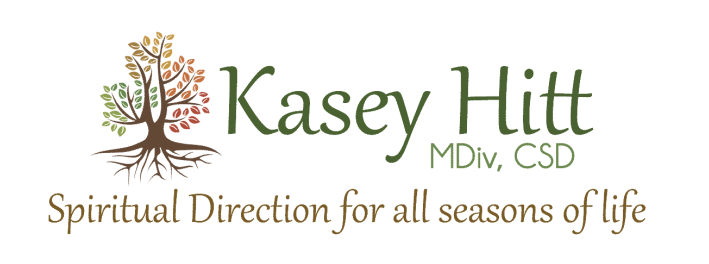|
As I look forward to speaking at Day 7’s 2021 Self Care Summit on September 14th on "The Wisdom of Colors," I revisited one of the workshops I offered for them in 2020, "Resilience for Spiritual Caregivers." A friend and I were talking about resiliency the other day. Life has presented some big challenges to us recently and we are weary. Some days can feel like a slog and other days a fight "to get back to a sense of normal." Being resilient feels like extra pressure. And if we're honest (& if I'm paying attention to my constantly twitching eye!), we don't know how much more we can take before we crack (thank God I have a good therapist and spiritual director!). So what does it mean to be "resilient"? The Seattle School of Theology & Psychology has been doing research on the topic through their Resilient Leaders Project. Their findings have encouraged people to move away from the idea of resilience as “coping” or “bouncing back.” Coping strategies or self-comfort behaviors may offer some short-term relief but can impact us in negative ways in the long-run. Constantly comforting myself on desserts every night or binging on Netflix for hours a day inevitably will hurt my physical, mental, emotional, spiritual, and relational well-being. They are a temporary solution (and sometimes that's what's needed that moment) that are not a viable long-term one. "Bouncing back" offers an image of returning to who you once were prior to a crisis or before the challenge occurred. But can you really return? Is "getting back to" a redemptive strategy? What if resiliency is growing and becoming stronger in meaningful ways in response to adversity, much like muscle growth? What if the crisis or difficulty you are going through right now has the potential to deepen and grow you in remarkable ways, would you be interested? Watch the video below to discover more. And join me for "The Wisdom of Colors" at this year's Summit as we have fun while gaining insight into the messages colors may be bringing us. Why might the color yellow be showing up when you close your eyes to pray or meditate? What might all the green in your recent dreams offer? The wisdom you are seeking may be in the color you chose to wear today! Tuesday, September 14th, 10:00-11:00am CT Register here.  Photo by Jacqueline Martinez on Unsplash Photo by Jacqueline Martinez on Unsplash There are those poems and prayers that one returns to again and again. This is one of those for me. Patient Trust was written by Pierre Teilhard de Chardin, a Jesuit biologist, philosopher, and paleontologist. Paleontology is the study of ancient life and its changes through the fossil record. Fossils take a long time to form. The processes Chardin observed in nature, he also observed in the soul. Let's not forget that we, too, are part of nature! And the Earth has wisdom to share with us who are often hurried and harried. Patient Trust Above all, trust in the slow work of God. We are quite naturally impatient in everything to reach the end without delay. We should like to skip the intermediate stages. We are impatient of being on the way to something unknown, something new. And yet it is the law of all progress that it is made by passing through some stages of instability-- and that it may take a very long time. And so I think it is with you. your ideas mature gradually—let them grow, let them shape themselves without undue haste. Don’t try to force them on, as though you could be today what time (that is to say, grace and circumstances acting on your own good will) will make of you tomorrow. Only God could say what this new spirit gradually forming within you will be. Give our Lord the benefit of believing that his hand is leading you, and accept the anxiety of feeling yourself in suspense and incomplete. -Pierre Teilhard de Chardin, 1881-1955, French Jesuit, paleontologist, biologist, and philosopher. Found in Hearts on Fire: Praying with Jesuits, p. 102-103. ________________________________
Live with this poem-prayer for an extended amount of time. Notice if you are drawn to the same word or phrase or different ones. What is Patient Trust's impact on you? Do you detect any soul shifts (even if subtle)? Our life experiences color the lenses through which we see the world, including words! When seeing the words “simplicity” and “settling,” my friend, Norman, could not help but reflect on his work-life. Having been in the military, then working internationally and later on in ministry with an itinerant system, his life was anything but simple or settled! Upon deeper reflection, he saw the positive sides, or wisdom, in both words. He offered me a quote from Dietrich Bonhoeffer to explain (I'm including a longer version of it for context): “A man can hold his own here only if he can combine simplicity with wisdom…To be simple is to fix one’s eye solely on the simple truth of God at a time when all concepts are being confused, distorted and turned upside down…The wise man is the one who sees reality as it is, and who sees into the depths of things. That is why only that man is wise who sees reality in God…There is no true simplicity without wisdom and there is no wisdom without simplicity.” Within this quote I, too, saw wisdom in both “simplicity” and “settling.”
And I was reminded of the Benedictine vow of “stability.” There’s a literal vow of stability for the Catholic men and women who commit to enter into, and be faithful to, a particular community in a particular place. It is fascinating to hear the stories of those who have been in a particular monastery for 40 years or more. However, this literal vow to a place may be an impossibility for many of us as it was for Norman during his working years (though it is much more of a possibility during his retirement years!). There is also a metaphorical or figurative vow of stability which is remaining focused on the Kingdom of God or what Bonhoeffer calls the “simple truth of God” wherever one finds oneself. This does not mean ceasing to question or doubt, both of these can deepen faith (as working through questions and doubts in a marriage can deepen the relationship). In fact, settling our eye on the simple truth of God frees us to question and doubt! One could say that "settling" in this context invites one's gaze to "rest and remain" on God. So for Norman (& for us), “settling” does not have to be a negative word meaning a life-draining “giving up” or “resignation” and “simplicity” is not something that only occurs in retirement! Instead, both can be the foundation for a creative life with God as we allow ourselves to see “reality as it is” by diving deeper into “simplicity” and “settling” as ways of Wisdom. ____________________________ Spiritual Direction is a wonderful place to explore "simplicity" and "settling" in your own life.  Photo by Mariana Beltrán on Unsplash Photo by Mariana Beltrán on Unsplash I asked my dear friend, Linda, what she thought the difference between "simplicity" and "settling" were and her answer surprised me. "Simplicity asks, 'What do you truly want?''" She went on, "With settling, I may settle for what I don't want and since it's not what I want, I keep looking for it.'" Then she shared an example from her own life. Many years ago, a woman asked if she wanted a certain set of dishes for her wedding and if she did, this woman would buy them for her. She really did not want them, but she felt uncomfortable saying "no" so she received them as a wedding gift. Since she had them and could get more pieces to match, she expanded her collection of dishes she did not want but settled for. But she noticed something. Whenever she was at a store that sold dishes, she looked at the patterns. Years of time and energy were spent on looking for dishes when she already had a full set! Her longing was left unsatisfied because she had settled so many years ago, afraid of offending the gift-giver. Now having retired, she decided it was not too late and she knew what she wanted. Much to the surprise of her family (who never knew she did not like the dishes!), she decided to box up her collection and put them for sale on a neighborhood social media site . Then she went out and bought the dishes she truly wanted, a beautiful butterfly pattern. Another woman happened to see the dishes she had for sale and was overjoyed for she had been looking for those exact dishes because they reminded her of her mother! Both were full of joy and satisfied with their purchases. Guess what happened after that? My friend stopped looking for dishes! We went on to talk about how we tend to buy things that are only on sale or we get what is cheap because we can have "more" of the item. Sometimes this is okay, but when it becomes a pattern, our collection of unwanted, unused stuff grows along with our dissatisfaction which compares and wants more. What do you truly want? It can be a difficult question. We need to stop and think rather than compulsively or fearfully say "yes" to what we do not want (or allowing others to decide for us or think we should want what others have). Jesus often asked people like blind Bartimaeus, "What do you want me to do for you?" It's not that Jesus could not see what Bartimaeus wanted, He wanted Bartimaeus to "see" and say for himself! It is a simple question. Yet answering honestly may just simplify the amount of internal and external stuff that becomes a burden--now that's a gift!  Photo by Darius Krause from Pexels Photo by Darius Krause from Pexels Honestly, I really don't. As a Spiritual Director, I'm listening and looking for life. For some this looks like a daily time set aside for reading Scripture and praying with words (whether silently, written, or spoken). This can be a very grounding and growing time. Or it can be a burdensome box on the spiritual checklist marked by guilt-if-I-don't-do-it. Even worse, it can be a time to grow the ego (rather than the mind of Christ). Reading the Bible and memorizing Scriptures are not a guarantee that one is on the path of and toward Life. Some things may have the appearance of life but underneath we find superstition or pride in disguise. However Spirit is in the process of utterly transforming our hearts (which impacts the lenses through which we see the world, including Scripture), that is what I am looking and listening for when I sit with a person in Spiritual Direction. Let me give an example: One person felt guilty because they did not want to do a one-year-Bible study initiated by their peers. I affirmed their resistance which was telling them the truth--should they say "yes" out of obligation, they would only grow resentment, not life, in their relationship with God and others. As I continued to listen, it became clear that this person would step out of their particular compulsions and into a deeper place the more they spent time in Nature (God's first revelation) and working with wood. Nature and Beauty were of utmost importance in growing in Love and Life. Their year would be better spent outside and in their workshop. There is no one-size-fits-all contrary to what you may have heard as a child, young adult, or a newbie to tending to the spiritual life. Having regular, uninterrupted time on the couch with a cat or dog or sharing a peaceful and delicious meal with one's partner, both are life-giving, love-growing practices. Others may find that silent meditation or reflecting on a poem expands their soul. Working with a dream from the night before, puzzling over a vision, wrestling with a spiritual question, painting, gardening, playing with children...the possibilities for spiritual practice and experience are endless because God is endless. It also does not have to be either-or when it comes to spiritual practice...either I read the Bible or I spend time in Nature. You might read the Bible in Nature. Spending time in Nature may give you new eyes with which to see the Bible when you do read it next (or you might discuss different ways to read Sacred Scripture with your Spiritual Director). So how do you know if your "daily quiet time" or spiritual practice is life-giving and growing? Reflect on the practice after you've engaged it for a length of time, at least a month. Any given day can feel like a slog and the fruit of the practice may show up outside of the time itself! For instance, after time in Nature, you may be calmer, less reactive, and more patient with others. Here are some questions to discover the fruit your practice is bearing (or not):
If you come for Spiritual Direction, I'm not going to give you Bible verses to memorize or critique your spiritual life. I'm going to listen for life within your life so that you may walk in the way that leads to Life (which is what the Bible encourages us to do!).  As a Spiritual Director, I’m on the lookout for “fake Jesus.” Whether during the very first session or sometime later through conversation, Ignatian contemplation or other kinds of guided prayer, the Jesus that a person has internalized arises. Remember, a person doesn’t have to be a Christian to have an image of Jesus that dwells within them, impacting the way they think about or view anything Jesus-related. Our image of Jesus, like our image of God, matters. This image is often pieced together in childhood. Early paper cutouts with fuzzy backs stuck to flannel boards, the voice and actions of a parent, pastor, or Sunday School teacher, experiences in Vacation Bible School, childhood books and pictures... In fact, it appears that even the Gospel writers may have pieced together a “Jesus” that didn’t always align with the authentic Jesus. Stephen Mitchell in his book, The Gospel According to Jesus: A New Translation and Guide to His Essential Teachings for Believers and Unbelievers, reveals how the early church writers included not only words and actions that Jesus likely said and did (since he didn't write anything down himself), BUT they also included words and actions they and their community needed him to say or do to fit their own beliefs! If what “Jesus” says is in opposition to the authentic Jesus’ main teachings (especially loving God and your neighbor as yourself), there’s a good chance the writer is making Jesus in his own image. This same “making-Jesus-in-our-own-image” and having him align with our own beliefs is on blatant display this political season! Now rather than being threatened by Mitchell’s idea, I find it’s helpful in developing skills in discernment. Remember, Scripture is “living” which means it “speaks” to us as we wrestle with it (which is to join in the lineage of the literal name of Israel!). It changes as we change and grow. Try living with a particular text, a story, a single Scripture for a month and notice how it changes (& how it changes you)! There is no end to new and deeper insights. Back to our images of Jesus…these images are rarely questioned. When an internal voice is associated with Jesus, a person automatically thinks it’s Jesus! So rather than simply agreeing with them, I listen to the person describe their interaction (always keeping in the back of my mind Jesus’ authentic teachings and his nature as revealed by his authentic teachings). Sometimes I’ll hear them say things like “Jesus has to knock me upside my head to get my attention.” If during a guided prayer, a door or a place of darkness often appears, “Jesus” will tell them not to look or go through it, to only focus on the light. Curiosity is helpful here. I’ll ask, “Whose voice does Jesus’ remind you of?” or “Why don’t you go back into your imagination and simply observe Jesus for a moment, what do you see?” Every single time, there is surprise. The response is often: “My whole life I thought it was Jesus’ voice I was hearing but it was actually my father’s!” "Oh wow, now that I'm looking closer, He looks like a flannel board Jesus. Kind of flimsy, not able to open the door.” “Jesus doesn’t really have much substance, he’s ghost-like, but as I watch he’s becoming more human.” And when Jesus becomes more human, more of his authentic self, they experience His great tenderness and strength. In doing so, their own tenderness and strength is called forth. With this Jesus, they find they are able to open doors and enter into places of darkness they never thought they could. With this Jesus, they are able to love the parts of themselves and the people they never thought possible. In other words, in coming in contact with the authentic Jesus, they are able to love their neighbor as they love themselves!  Finding yourself triggered more than usual with thoughts and feelings of rage, resentment, and judgment? I know I am. And it's not just toward others (we'll focus on that next week)! What are we to do with inner voices of critique and judgment, chronic dissatisfaction and frustration? How do we not let ourselves be beat up by them? Is there another way? Jesus once summed up the entire Scriptures by saying, “'Love the Lord your God with all your heart and with all your soul and with all your mind.' This is the first and greatest commandment. And the second is like it: ‘Love your neighbor as yourself.’” (Matthew 22:37-38) “Loving your neighbor as yourself” is to “loving the Lord your God,” as the moon is to the sun. The former reflects the latter. Like the line from his prayer to the Father, “Thy Kingdom come, Thy will be done, on earth as it is in heaven,“ Jesus teaches and prays for wholeness—inner and outer continuity, authenticity, alignment. Oneness with God, self, and neighbor. “Loving yourself” is inextricably linked to “loving your neighbor.” Think of those best friends necklaces with two halves, both are needed to make the heart whole. So let's begin with our part--ourselves. Tell me, how are you loving yourself these days? How would you characterize your inner conversations? Are they best friends necklace worthy? Is your inner landscape characterized by harmony and peace? What/who is your inner world reflecting? Given I resonate with a One on the Enneagram, inner critique and compulsive improvement of myself (& others) along with their counterparts of rage and resentment are easily accessible. They are often lurking, looking to supplant the inner voice of Love. When that happens, I cannot relax so compulsive doing is often the result (and a red flag). Recently, someone brought up a class series I taught a while ago and said that what continues to stick with her most was how I started every class with the invitation to be curious. I usually write these three phrases at the top of the dry erase board or handout: “Be curious. Be compassionate. Be aware” Given the subject matter is designed to go deeper, I know most classes will challenge our surface-level survival self (our ego). In response, people can expect to experience resistance (and all manner of feelings). That's not bad. There's wisdom in the resistance if we look. Given what we're presented with on a daily basis right now, there's plenty of subject matter to challenge our survival selves, isn't there?! At any moment, fear may be triggered, or anxiety, anger, resentment, rage, envy, sadness, guilt, shame, even numbness and avoidance. Instead of harmonious, our inner world begins to look like a daily war zone where there isn't the space or ability to give and receive love since it's all about surviving the day. What can bring peace to the inner chaos? Certainly not more "shoulds"! Fortunately, God offers us paths of peace. One that I've found is choosing curiosity over critique. It almost immediately relaxes inner tension, opening me to the inner voice of Love. Remember, it was Moses’ curiosity that caused him to stop what he was doing and take a closer look at the burning bush. From inside the fire, the Voice of Love spoke to him. Try it. Be curious.
Once becoming aware of the tone, physical sensations, and triggers, then the next time you experience them, rather than continuing down the path of self-condemnation which can lead to inward or outward lashing out, pause. Turn your compassionate gaze toward that inner burning (or numbness) and be curious:
Let's play with this concept of curiosity with ourselves. Next week we'll consider curiosity with others. Recently my daughter started fencing. It's been the perfect socially-distanced sport...masked, gloved, and if you come within 6 feet, you get stabbed! Still in her uniform after practice one day, she put on her helmet, pulled out her épée, and walked outside as I sat on the porch. She began practicing her stance. Noticing it had changed since June, I asked her what she had been doing differently. "Well, my coach said I would get tired if I was constantly holding my left arm up in a flexed position and he pointed out how I kept rising into the stance. He told me to relax my arm and settle into the stance instead." Then off-the-cuff she added, "So don't rise to the challenge, Mom, relax into it!" Rather than "en garde," it caught me "off guard"! "Don't rise to the challenge, relax into it!" Her words and the image they created have been in my mind ever since. Why? Well how often have you heard or been taught to "rise to the challenge"?! And are you, too, worn out from all the rising? So let "en garde" be a reminder. Be ready for action by relaxing into your stance. Paradoxically, this allows one to better (and more naturally) be in position to meet the challenge, whether it's with épée in hand or not. How might you "relax into rather than rise to the challenge" today? What happens when we discount small actions or fear the possibility of humiliation?
We may not act at all. When we embrace both, we’re free to act. Any life-giving act, no matter how small, matters. According to Jesus, the Kingdom of God is like a mustard seed someone planted or like yeast a woman worked through a large amount of dough. Both the mustard seed and yeast required action from someone to bring about their potential. Both seed & yeast, the required action, and even the people may seem small and even hidden. Both may be small and hidden, but some actions require more (planting a seed is easier than kneading yeast through 60 lbs of dough!) Both contain big potential to benefit an entire community, offering nourishment in a variety of ways:
All of this from two small actions! If we're going to be sowers of seed and kneaders of the Bread of Life, know this... Action is never humiliation-proof. According to Fr. Richard Rohr, we're to pray for one good humiliation a day! What a way to stay humble and inevitably learn that humiliation is often a gateway to transformation! I promise you, especially if you, like me, are White (& an Enneagram One), it will happen as you enter into the on-going work of antiracism. Last fall, my daughter and I went to a weekend seminar to hear Nobel peace prize nominee, Fr. John Dear, talk about “Jesus as Peacemaker.” It’s been a constant part of our conversations ever since, becoming richer with insights from others. Earlier this year, Abby Buter pointed out the difference between being a “Peacekeeper” and a “Peacemaker” during the “Meditating with the Aramaic Beatitudes” class. The distinction is important…Jesus was the latter & said it’s the latter who are blessed. Fr. Dear gave my daughter a new language of nonviolence and she’s been quick to point out when I’m not (& other Christians aren’t) following in the footsteps of the nonviolent Jesus…oh the blessings of having a teenager in the house! But she’s right. And having it pointed out can be humiliating. When my children saw the video and photos of George Floyd, they were distraught. The conversation around Jesus and nonviolence needed to be taken to the next level. I decided to begin with my own faults and humiliations so they would learn not to fear their own. Around the dinner table, I told them stories from my own life of how I have thought, said, or did things that contributed to racism and upheld racist beliefs and systems. We talked about the reality of having inherited racist ideas as a culture and how Western Christianity’s own “superiority complex” has added to the problem by often making us overtly or covertly feel like we are definitely on the “winning team” and others are not. I told them of when I was a youth pastor and met with a community organizer after having spent time in Mississippi with Dr. John Perkins who encouraged me to do the same kind of community and racial reconciliation work with our students in our Missouri town rather than go elsewhere. Conversations with a couple of Black pastors in the area led me to talk to the Black community organizer. After telling him what I wanted to do, he laughed, and I felt humiliated. He pointed out how it was fine that I wanted to bring my students from the north side to the south side to help paint or whatever, BUT, it still didn’t change the fact that what the predominately Black kids on the south side were using as a community center was an old building that no one else wanted (but the kids were still happy to have) while the predominately White kids on the north side enjoyed a brand new top-of-the-line sports complex. It was an eye-opening conversation. Noticing my humiliation and naivete, he said, “I like you” then continued to challenge my White privilege. Doing “good work” and being a “good person” weren’t enough. At the end of our time, he still put me in touch with those who could help me line up service projects and then he sent me on my way (which included crossing a threshold I had no idea I would be crossing when I first walked in there). It was later that I could see how he was trying to open my eyes to the larger systemic problem of racial inequality and the problem of “White Savior Complex”--- our White Christian youth group would feel good about “helping” but the larger problems would still exist after we left (& in some cases our help would further uphold the problematic systems). Looking back, I’m grateful for the humiliation! Why?
Last month the opportunity to join an online discussion group facilitated by a Black friend from high school on the book, How to Be An Antiracist, came up. Aside: I've enjoyed listening to author, Ibram X. Kendi, read the audio version; often my kids listen, too. I knew a good humiliation (or more!) would come as I listened, shared, and became even more deeply aware of my ignorance both in high school and now (i.e. How did I not or how have I continued to not see, know, or consider this before?). However, experience tells me that humiliation need not stand in the way (and often is the way!). Do the conversations with family, friends, and neighbors matter? Does the discussion group matter? Refer to Jesus’ parables on the mustard seed and yeast. ______________ Two resources for ongoing learning, awareness & action:
Conventional language regarding spirituality tends to focus on work-related words. We speak of spiritual practice, discipline, effort, work... These words distract us from the truth about spirituality. Work is all about earning something, doing something, getting somewhere. But spirituality is all about accepting, receiving, embracing, and surrendering. It is as if we want spirituality to be difficult so as to excuse our not bothering with it. Better to speak of spiritual play than spiritual work. Play can be no less intense and engaging, but it doesn't hold out the hope of a prize. You play for the sheer fun of playing. When your spiritual life is done for joy, your life will be filled with joy. -Rabbi Rami Shapiro, Hasidic Tales: Annotated & Explained Need some spiritual play in your life?
Let's talk about all you've been juggling and ways you can surrender to joy! |
AuthorKasey is a scarf, ball and club juggling spiritual director just outside of Nashville, TN. Play helps her Type-A, Enneagram 1 personality relax, creating space for poetry and other words to emerge. She also likes playing with theological ideas like perichoresis, and all the ways we're invited into this Triune dance. Archives
January 2024
Categories
All
|
By clicking “Sign up for E-News” I consent to the collection and secure storage of this data as described in the Privacy Policy. The information provided on this form will be used to provide me with updates and marketing. I understand that I may modify or delete my data at any time.



 RSS Feed
RSS Feed

